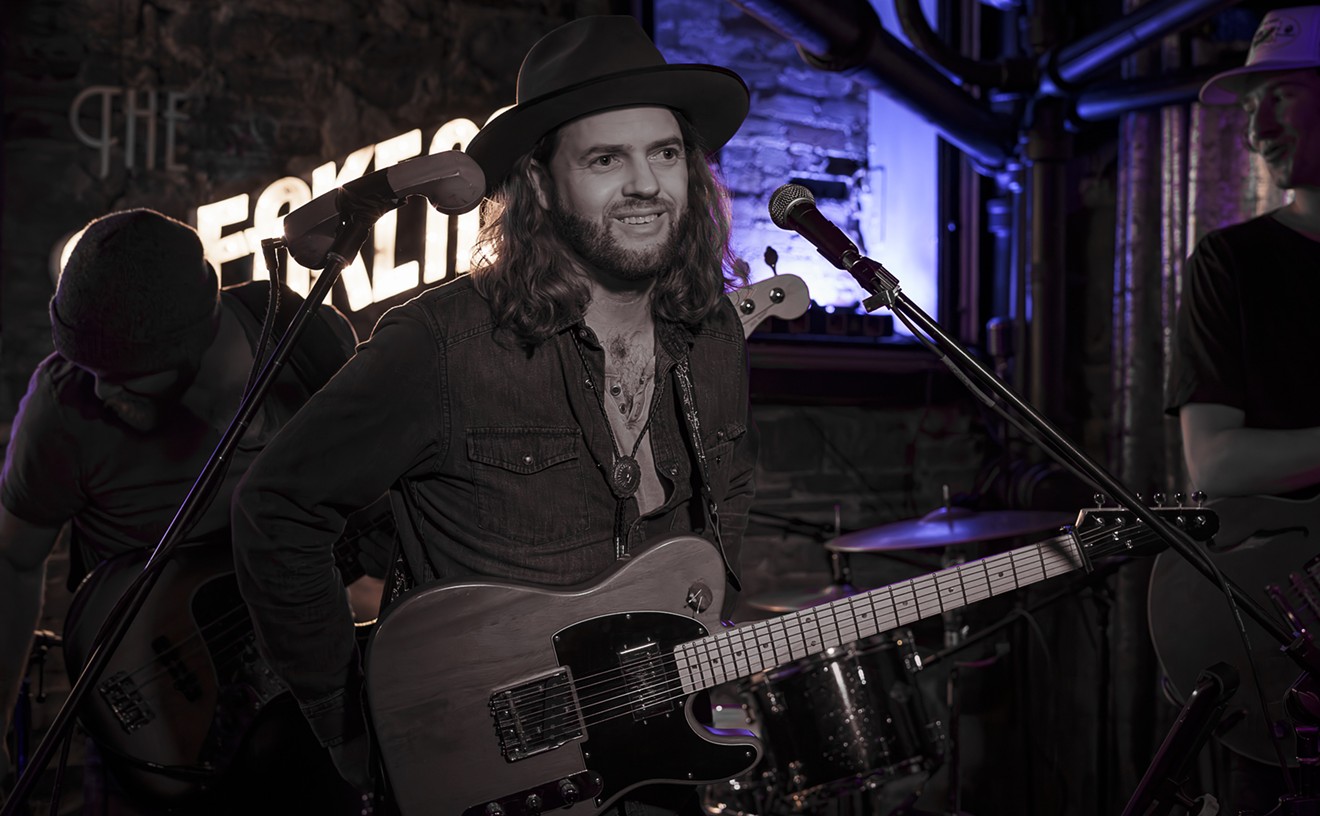San Diego-based electronic band Prayers performed at Riot Fest on Friday, August 28, and proved to be one of the most electrifying acts of the entire weekend. When Rafael Reyes and Dave Parley took the stage, there was a relatively sizable crowd assembled in front of the Radicals Stage setup (where the rodeo normally goes down) at the National Western Complex. Much of the material was drawn from the group's latest album, Young Gods.
Musically, it was like an updated '80s electro-industrial sound, with hard-hitting percussion and emotionally charged vocals conveying a fascinating blend of vivid storytelling about street life and more universal existential crises. Rather than dwell on a low point, Prayers' songwriting puts emotional energy into transcending personal darkness while embracing and nurturing one's basic human frailties. Perhaps partially tongue-in-cheek, Prayers refers to its music as “cholo goth,” as explicated so well in a recent Noisey mini-documentary.
From its imagery to its lyrics, music and stage presence, Prayers reflects a true synthesis of the San Diego barrio culture and the goth subculture, including the religious and occult/mystical aspects of each. This alchemy of influences had its roots in Reyes's early fascination with the goth and electro-pop music he saw and heard on MTV in the early to mid-'80s, combined with the influence of his family's Latino culture.
Yet Reyes did not initially focus on music. “I was born an angry kid, and I saw therapists from a young age, because I was violent," he says. “I don't know what, exactly, it was, but I had a violent streak. My mother and father were concerned, because they thought I would end up in jail. So they found counselors that were free because we were poor.
"I never knew what I was going through, but I could go from zero to a hundred rapidly. I didn't have outlets, and I felt like a weirdo and tried to act like everyone else to fit in, but no matter how hard I tried, I felt different. I always felt like I didn't belong and should have been born to a different family. I felt like I didn't have an identity, so I rebelled against anything conventional.”
Eventually, Reyes did end up in jail, where he had a dream in which his by-then-deceased father appeared to him and forgave him for any past slights and encouraged him to pursue his dreams. Reyes cleaned up, learned the basics of composing music and making beats, and initially performed as Nite Ritual. Soon, offers came in to collaborate, and he joined the bands Vampire and Baptism of Thieves before teaming up with longtime supporter Dave Parley in 2013 to form Prayers.
Even in conversation, Reyes is able to articulate complex emotional states with real nuance and insight, a skill he chalks up to his experience of seeing therapists at a young age. His creative impulse with Prayers is to empower others by challenging stereotypes.
After the show, Reyes came off stage and met with anyone who wanted to talk to him. He posed for pictures and was extremely gracious. Reyes may seem like some to be a living contradiction, but he reconciles light and dark, death and life. He challenges stereotypes by virtue of who he is, and the art he makes is informed by that critical compassion, patience and love he had to learn to embrace.
“Recently, I got this e-mail from this Nazi, white-power Aryan Nations guy,” says Reyes. “He told me, 'Listen, I saw your interview on Vice and then I started listening to your music, and you've inspired me and touched me. I can identify with you because I grew up in this environment in which I was taught to hate, but I knew in my heart that wasn't me. So I had to play the game just to survive because my family is racist. It wasn't until I heard your music and saw your interview that I realized that I'm like you and I don't want to be that anymore.' He wanted to be free from all that, and my words gave him the power to break free from that.”
[
{
"name": "Air - MediumRectangle - Inline Content - Mobile Display Size",
"component": "12017618",
"insertPoint": "2",
"requiredCountToDisplay": "2"
},{
"name": "Editor Picks",
"component": "17242653",
"insertPoint": "4",
"requiredCountToDisplay": "1"
},{
"name": "Inline Links",
"component": "18838239",
"insertPoint": "8th",
"startingPoint": 8,
"requiredCountToDisplay": "7",
"maxInsertions": 25
},{
"name": "Air - MediumRectangle - Combo - Inline Content",
"component": "17261320",
"insertPoint": "8th",
"startingPoint": 8,
"requiredCountToDisplay": "7",
"maxInsertions": 25
},{
"name": "Inline Links",
"component": "18838239",
"insertPoint": "8th",
"startingPoint": 12,
"requiredCountToDisplay": "11",
"maxInsertions": 25
},{
"name": "Air - Leaderboard Tower - Combo - Inline Content",
"component": "17261321",
"insertPoint": "8th",
"startingPoint": 12,
"requiredCountToDisplay": "11",
"maxInsertions": 25
}
]











